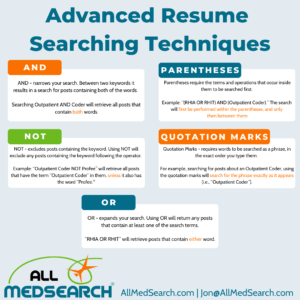
Put in simple terms, a Boolean is data that can either be one of two conditions: true, or false. Booleans are usually found in computer programming languages, where users can test whether data entries contain specific details.
It turns out, however, that Booleans are not only utilized by computer programmers. Recruiters use Boolean searches all the time to find resumes that contain specific words and phrases. The most used operators (the + in 1+1, for example, is the operator!) in Boolean searches are AND, OR, NOT, quotation marks, and parentheses. Booleans will help you find the right candidates for the job while taking less time and effort to sort through a plethora of resumes.
Quotation Marks:
Using quotation marks in your Boolean search is a good way to filter resumes that contain a specific phrase or keyword you are looking for. If you were to search for a “surg tech”, the only resumes you would receive would have the phrase “surg tech” in it. You need to be aware however, that searching “surg tech” will not get you resumes that say, “Surgical Tech” or “Surgical Technologist”. The search engine interprets quotation marks literally and will only provide you with what you tell it to. It cannot understand that a surg tech and a surgical technologist is the same thing.
Quotation marks can also help you refine your search to prevent redundancies. If you’re searching for a registered nurse, it can be very helpful to place the search term in quotes. Otherwise, you might end up looking at resumes that contain both terms, but in irrelevant places (registered voter, certified nurse assistant, etc.).
The AND Operator:
Using the AND operator will filter your resume search down to entries that identically match two or more specific criteria. For example, if you needed to find an ICU Nurse who holds an RN license, you could search ICU AND “Registered Nurse”. The search engine will return resumes that contain both search terms and exclude all resumes that contain just one of the terms or none of the terms (the quotes ensure the resume will say registered nurse on it!). This can help you find candidates who are required to have specific certifications.
The OR Operator:
Like using quotation marks, the OR operator allows you to find resumes that contain any of the specified criteria you enter. Since quotes are taken literally by the search engine, it can be of great use to utilize both quotes and the OR operator synergistically, so that you can broaden your search while maintaining a specific search criterion. For example, having to find ICU RN’s by making individual searches for “ICU RN”, “ICU Registered Nurse”, “Intensive Care RN”, and “Intensive Care Registered Nurse” can take a while. If you were to search “ICU RN” OR “ICU Registered Nurse” OR “Intensive Care RN” OR “Intensive Care Registered Nurse”, the engine will return with resumes that meet any of those four search criteria. Using the OR operator can allow you to receive more relevant resumes from one search, saving you time and effort.
The NOT Operator:
Unlike quotation marks, the NOT operator will exclude results that contain specified criteria. Let’s say you are looking for an inpatient medical coder, but they cannot have this specific certification: CPC. You could search for an “inpatient medical coder” NOT “CPC”. The search engine will not present you with any resumes that contain CPC in its dataset, but it will give you any resume that says inpatient medical coder (keep in mind that Certified Professional Coder will slip through, refer to using quotations).
Parentheses:
If you need to make an advanced search with several Boolean operators, you may consider using parentheses. Parentheses operate like how they do in mathematics; the computer will consider anything inside the parentheses to be grouped together. If you needed to find a medical coder who does not code pro-fee, then you might search for “medical coder” NOT (“pro-fee” OR “professional fee”). In this example, the search engine will look for medical coders who specifically do not mention pro-fee or professional fee in their resume.
Take the time to understand how Boolean searches work; it will save you in the long run when you’re on the search for the right candidate.
